We got the best news this past week, the permit is approved and we just picked it up from city hall.
Now our contractor can start work. But before that, we have a little bit more demo to do.
We got the best news this past week, the permit is approved and we just picked it up from city hall.
Now our contractor can start work. But before that, we have a little bit more demo to do.
A series published by The Taunton Press:
Our friends Dave and Cher Larson, and Marji Karlgaaurd loaned us some of Sarah Susanka’s books even before we bought our vacation home. Anne read these cover to cover; thank you friends!
Edwin has been reading the Home Depot 1-2-3 home reference series published by Meredith Books for many years now.
Guide Books (the Green Edition) by Creative Homeowner publishing:
From Sand Castles to Dream Houses, A planner for building or remodeling your home. by Sheri Koones.
Graphic Guide to Frame Construction by Rob Thallon.
Living in the Past, An owner’s guide to understanding & repairing an old home, by Scott Austin Sidler.
Minnesota’s Own, Preserving our grand homes, by Larry Millett with photographs by Matt Schmitt.
Shingle Styles, Innovation and Tradition in American Architecture 1874 to 1982 by Leland M. Roth, Photography by Bret Morgan.
Shingle Style Architecture for the 21st Century, by Ashley Rooney
Shingle Style Houses, Past and present by Ashley Rooney with John C. McConnell and Turner Brooks.
Many friends/family have not understood why we chose to keep the century old wood windows instead of changing to vinyl or aluminium. Among many chapters of other books, blogs, or parts of home remodeling shows, this book goes into more detail of our eco friendly choice.
Aside from reading books (which was mainly Anne’s way getting educated about remodeling) we both also spent time watching these great shows on the DIY Network and HGTV channels on DirecTV
On October 17th we received the structural engineering report. The good news was that the foundation of the home is solid and that we can put all of our focus on the framing and structure of the home.
We submitted the report with a permit request form and some of the drawings to the city building inspector.
She responded with the message that she was missing some details on the front porch rebuild.
This requires a lot more effort than I throughout it would, and I have to spend some time on the research.
So much to do, so little time….
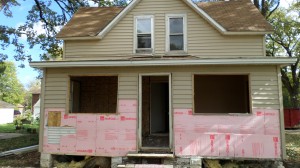
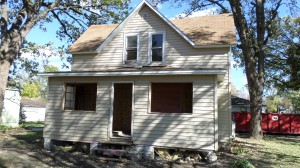
The porch gutting was done, but the siding was still off. We did not want to give this ugly view to our neighbors, so the first thing I did is reinstall the siding.
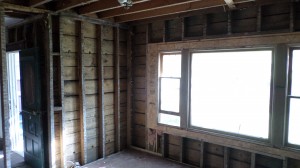
After that was done, I had to remove the remaining insulation from the walls.
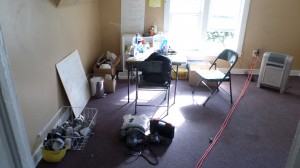
Then it was time to organize all the stuff we have accumulated in the home; Tools, safety equipment, etc.
At the end of the day, I winterized the house. This means that you drain all the water lines, and put anti-freeze into drains. Followed by putting tape over the faucets and drains, so that folks don’t inadvertendly put any water down them.
I also had to return a bunch of items to Menards that I did not use (house wrap, staple hammers, etc).
Aside from these actions, I had a meeting with the city building inspector to discuss the project. See my next post for how that went.
I had a conversation with the contractor we are working with and he asked if I had spoken to the city yet about our plans. My answer was a slightly surprised: “No, should I have?”
I honestly thought that you created the plans, and then you submit them and get the permit (or push-back) and you resolve it then.
Anyway, the contractor contacted the City and we had the building inspector come over for a consultation visit.
We collectively came to the conclusion that a structural engineer should have a look at the home and assess the various issues we have found and also assess the changes we want to make to the home’s structure.
Yesterday evening I discussed with Anne what I still needed to do besides the porch removal and the work involved with taking the remainder of the porch down. We decided to leave the porch, in its open form, as is for now. This was a huge relief, since there was still a daunting task ahead of me to finish the removal and to keep the home weather proof.
I could therefore visit the historical society (see other post) and work on removing some remaining lath and plaster. I also needed to get some more stuff to winterize the home. And I needed to get a camera, since I had forgotten to bring one from CA.
The first thing I did was to go out to a couple of stores to find a match for the current siding of our home. I was successful and it is still commercially available. This is a huge relief, not because I like this siding so much, but because it saves us the cost of residing the entire house when we do the remodel.
The siding make/model/color is: CertainTeed/Mainstreet D5/Savanah Wicker.
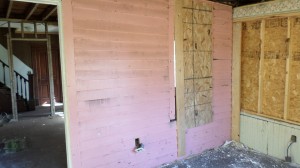
I was pleasantly surprised in the afternoon, right at around 4:30, two of the tech students came by to help (I had given them an open invitation) and together we got all of the porch ceiling removed and it was heavily insulated. The dumpster bin is nice and full now. We found out what color the wood siding was just prior to closing up the porch: Pink (yes, we pity the neighbors too)
We all worked until it got dark (I bought a flood light this morning, but I did not want to risk anyone getting hurt).
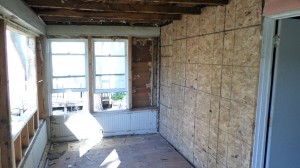
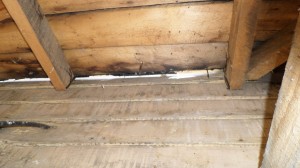
The porch is gutted to a point where the next thing to do is to remove the structure and build the new one.
One of the goals of our remodel and rehab efforts is to ensure that the exterior of the house stays true to the Shingle building style of the late 1800’s. Since the Shingle style was started on the east coast and later migrated inland to the midwest, we want to know what the local Shingle style homes would have looked like. Anne had already contacted the local historical society to see if they by chance had old pictures of our home. This ended up not being the case, but they do have a large collection of pictures of local homes.
Anne had therefore put in a research request and the day before my trip to MN, we received an email with a variety of homes listed that were built around the time of our vacation home.
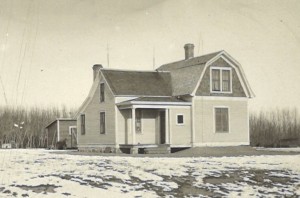
I decided that a visit to the office to pay the research fee and just to chat would be a good use of my time. And it was, found two pictures that reflected the Shingle style extremely well.
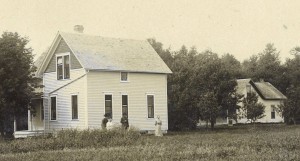
Back in town again and today was our first official work-party, hosted by Edwin. Anne is back in California, she will come to Minnesota later this month to host the second work party.
Today’s goal was to work with a group of the Tech Students to re-instate the original exterior wall on the west side of the house. This wall had been removed to make the front porch part of the main house and extend the guest bedroom downstairs. This is the first step to get the new design in place for our vacation home.
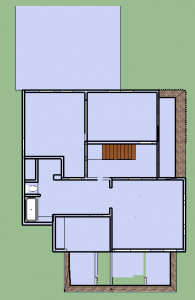

The plan for today was to start at 9am, but it is Sunday and our Lord deserves our time on His day, so Church first, so we moved the start time for our work party to 11am.
Having a later start time, limited what we could get done, but progress was made. The home was build in 1890 and therefore, all the lumber dimensions are different from today’s dimensions. The 2×4 studs are true 2″ by 4″ and not today’s dimensions of 1 1/2″ by 3 1/2″. So the plan to rebuild the wall meant that we had to use lumber from elsewhere in the house, such that we would be able to properly reconnect the studs.
The three tech students encountered what old-growth lumber is. It is HARD. We used decking screws to frame this wall, since the spaces were too narrow to hammer nails. Many of the screws simply snapped while driving them into the wood. We ended up having to pre-drill the holes and then put the screws in.
It took a solid 5 hours to get the studs of the wall up (mind you, we only needed to place 6 studs and frame a window opening).
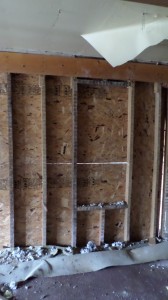
While this was going on, Dave and Cher, our local family friends came to the party to work and they were such troopers. They removed all the nails from the exterior facing walls, so that we can have the insulation folks come and spray-foam these walls. I think they were there for at least 3 hours and got all the nails removed.
Priscilla, another family friend came over just to drop off some delicious home-made oatmeal-raisin cookies and ‘rolls’. Oh yum!
After the studs were up, we put up some temporary sheathing to close up the house and we started the demo of the front porch. I had already taken as much of the re-usable siding off the porch walls as I could, since we are not sure if we can get the same siding again.

It is too hard to explain what we found inside this porch while doing this demo, but suffice to say, this home needs a lot of correction, removing this porch is the only way to correct this part of the house.
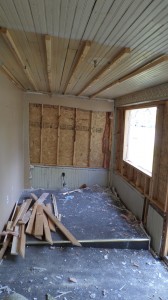
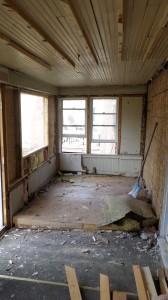
At 7pm we started cleaning up because we have no light downstairs. Most of the interior of the porch was removed, the windows on the street facing side of the porch were taken out (these will not be re-used and I hope to find takers for them).
What a day today. We had six Tech students as demolition crew. They all showed up right on-time. After some instruction and goal setting, they went to work.
The crew started right away with the removal of the old appliances and movable objects. Soon thereafter the cabinets (which we deemed unsalvageable, with the exception of the cabinet door handles) were taken down and disposed of. The walls and ceilings were next. The assignment was to remove the plaster and lath. The studs and wall structure should remain.
This is where it got very dusty. All of the crew worked with respirators on and we refreshed the pre-filters once throughout the day.
The crew in the kitchen split up to start working on other rooms. Two remained in the kitchen, two went to the living room and two went to the dining room.
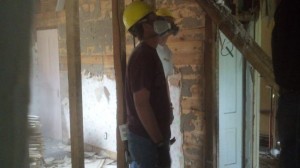
By the end of the day we had a fully gutted kitchen, mostly gutted living room (see separate post about the beehive we encountered 🙂 , and partially gutted dining and guest room.
The debris that was collected throughout this day filled one 30 cubic yard for about 80+% and a second one for about 25%.
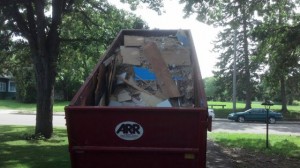
All in all a tremendously successful day. Tomorrow two of the six students will return to help us and we also expect some friends and family to show up. This is such an exciting project!
Time for bed.